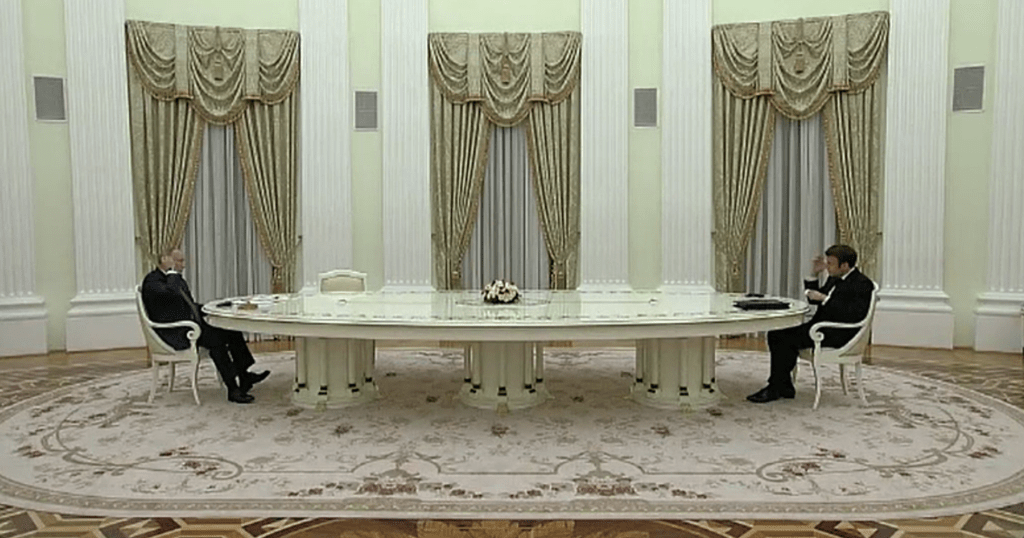Vladimir Putin, Catfish Diplomacy and the 2022 Midterms
 Sky News
Sky News
Lisa Van Dusen
February 12, 2022
Following his bilateral with French President Emmanuel Macron at the Kremlin last Tuesday — a exercise in oddball optics that included the 20-foot table sanitaire that launched 1,000 ping-pong, seesaw and Bernie Sanders mittens memes — Russian President and petulant Marvel villain Vladimir Putin said of Ukraine, “Like it or not, beauty, you have to put up with it.”
Fittingly enough, this use of the longstanding KGB code for foreplay to describe the current vulnerability of a country of 43 million people to non-consensual Russian aggression said more about the potential aggressor than the target. This dispute is less about Ukraine than it is about Putin, Joe Biden and timing.
After weeks of what I like to call “catfish diplomacy” — not because it’s based on the use of incremental misrepresentation of intentions and motives to get someone to fall in love with your Potemkin persona or send you a money transfer securing your release from a fictional prison in Azerbaijan but because it’s based on the use of incremental misrepresentation of intentions and motives to get someone to think any outcome to diplomacy is possible when you know that only one outcome is possible — the world is now watching and waiting for the big reveal of Putin’s outcome.
The timing of this standoff between Putin as the aspiring new world order, anti-democracy player and the democratic West in the form of NATO, the political leaders of Europe (plus the newly un-European UK), the United States and Canada was dictated by Putin. We would not be where we are if 100,000 Russian troops had not been observed along Ukraine’s borders last fall, one year before this November’s US midterm elections.
If Vladimir Putin’s hankerings to reunite Moscow and Kyiv and coerce the North Atlantic Alliance back into its 1997 pants out of Soviet nostalgia were the true casus belli for this operation, he’d have directed it toward the more hospitable environment of a Trumpian embrace rather than a Joe Biden deterrence response.
Which is why this is also about Joe Biden. In a moment of maximum tension between the existing, democracy-led international order and the aspiring China and Russia-fronted, anti-democracy, surveillance-state model, Biden is the most vocal and consistent defender of democracy on the global stage. In keeping with the narrative warfare proclivities of interests who generally prefer covert to overt operations and software to hardware but will settle for a kinetic sh*tshow as a means to an end, Ukraine could do for Biden’s presidency in 2022 what Afghanistan did for it in 2021. As a rationale for a midterm victory by a Republican Party that makes up for in treasonous anti-democracy utility what it lacks in collective sanity these days, a Ukraine disaster narrative would make every other pre-midterms propaganda thread currently under curation look like the Mean Girls Burn Book.
Corroborating the relevance of this context to the proceedings is the fact that Donald Trump — who has been to the aspiring new world order what Howdy Doody was to Buffalo Bob only more vulgar and less credible — occupied the Oval Office as recently as 13 months ago and for four years before that. If Vladimir Putin’s hankerings to reunite Moscow and Kyiv and coerce the North Atlantic Alliance back into its 1997 pants out of Soviet nostalgia were the true casus belli for this operation, he’d have directed it toward the more hospitable environment of a Trumpian embrace rather than a Joe Biden deterrence response.
If Putin’s other purported casus belli of a 30-year-old grudge for the alleged breaking of a promise on NATO expansion that was never actually made were not equally disingenuous, he’d have presented it between bouts of Trumpian bum-kissing during the July 2018 Helsinki bilateral. If there were a legitimate casus belli — other than the inarticulable one of timing — for Putin invading Ukraine, he wouldn’t have had to wheel out multiple manufactured ones, and NATO wouldn’t now be anticipating the possibility of Russia generating a false-flag pretext to belatedly justify an invasion after months of buildup.
At this writing, Russian Foreign Minister and Misdirection MasterClass instructor Sergey Lavrov continues the Kemlin’s game of geopolitical “I’m not touching you”, claiming that Russia has absolutely no plans to invade Ukraine notwithstanding its troop-swarm of Ukraine’s borders and deployment of tanks, artillery, fighter jets, helicopters, advanced rocket systems and troops by the thousands all across neighbouring Belarus.
“After Russian troops finish drills and return to barracks, the west will declare ‘diplomatic victory’ by having ‘secured’ Russian ‘de-escalation’,” Lavrov said in a statement Saturday, adding “predictable scenario and cheap domestic political points”. In other words, since our deception operation is designed to score cheap domestic political points in the United States, we balk at the notion of forfeiting that capability to our adversary.
Meanwhile, in Ukraine…
Lisa Van Dusen is associate editor of Policy Magazine. She was Washington columnist for the Ottawa Citizen and Sun Media, international writer for Peter Jennings at ABC News, senior writer for Maclean’s and an editor at AP National in New York and UPI in Washington.
